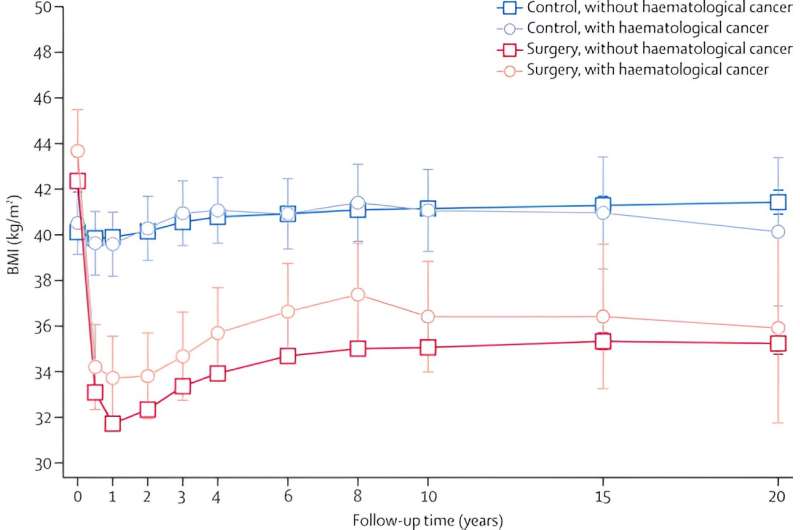This article has been reviewed according to Science X's editorial process and policies. Editors have highlighted the following attributes while ensuring the content's credibility:
fact-checked
trusted source
proofread
Study shows reduced risk of hematological cancer after bariatric surgery

Obesity surgery is associated with a 40% lower risk of hematological cancer. This has been shown in a study from the University of Gothenburg. This clear link is expected to influence future research in the field.
Previous studies have shown that overweight and obesity are risk factors for several types of cancer. It is also known that obese women have a higher risk of cancer than their male counterparts, and that the risk level decreases with intentional weight loss. However, evidence of a link between obesity, weight loss and hematological cancer has been limited.
The current study, published in The Lancet Healthy Longevity, used data from the Swedish Obese Subjects (SOS) study at the University of Gothenburg and data from the Cancer Registry at the National Board of Health and Welfare.
The researchers studied 2,007 people who underwent bariatric surgery and compared them to a control group of 2,040 individuals, also obese, who did not undergo surgery. The groups were otherwise comparable in terms of gender, age, body composition, cardiovascular risk factors and psychosocial variables.
Most significant improvements in women
During the follow-up period, 34 individuals in the surgery group developed hematological cancer, in parallel with a significant weight loss. The corresponding number in the control group was 51 hematological cancers, with the group remaining at the level of severe obesity.
Most of the blood cancers were lymphomas, and when these were studied separately, there was a 55% reduction in the risk of lymphoma in the group that had undergone bariatric surgery. The corresponding risk reduction for all blood cancers was 40%.
In particular, women with high blood sugar at the start of the study seemed to benefit from bariatric surgery. This is according to Magdalena Taube, Associate Professor of Molecular and Clinical Medicine at Sahlgrenska Academy, University of Gothenburg, and corresponding author of the study.
"The benefit of the surgery is linked to baseline blood glucose levels. The reduced risk of hematological cancer was much more pronounced if the women's blood sugar levels were high at the beginning, which clearly shows that blood sugar is an important factor in cancer development," she says.
Mechanisms with complex relationships
The researchers in the study point out that the mechanisms behind the link between obesity and blood cancers are complex and involve multiple factors, such as chronic inflammation and so-called clonal hematopoiesis, a type of genetically related risk factor for blood cancer. They suggest that the metabolic improvements that take place after bariatric surgery, including reduced inflammation, may reduce the risk of cancer.
"The results provide further support of considering obesity a risk factor for hematological cancer, and that bariatric surgery can reduce the risk of blood cancer in obese women," says Magdalena Taube, Associate Professor of Molecular and Clinical Medicine at the Sahlgrenska Academy, University of Gothenburg and corresponding author of the study.
More information: Kajsa Sjöholm et al, Long-term incidence of haematological cancer after bariatric surgery or usual care in the Swedish Obese Subjects study: a prospective cohort study, The Lancet Healthy Longevity (2023). DOI: 10.1016/S2666-7568(23)00141-1





















